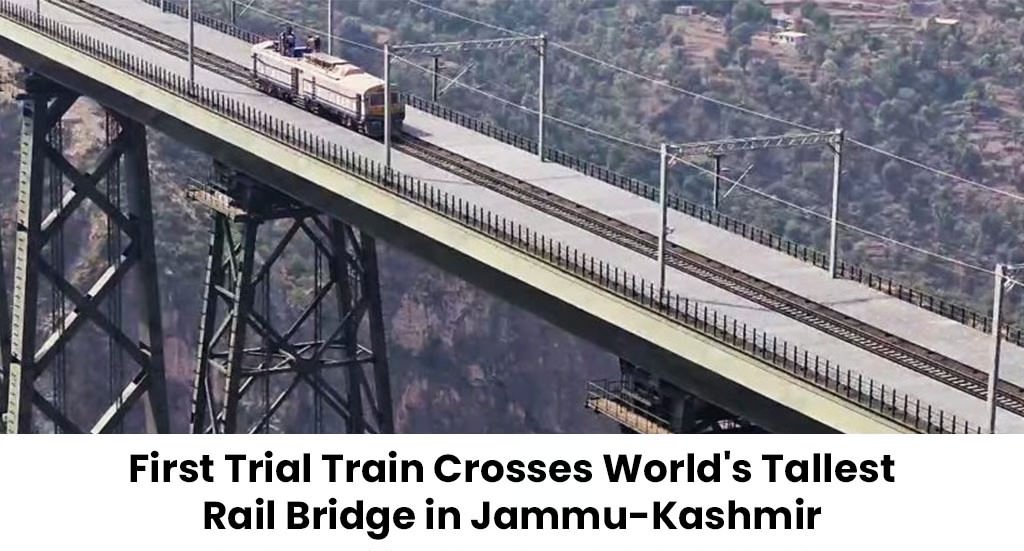Exciting news for Jammu and Kashmir! The Indian Railways has successfully conducted the trial run of the first train over the world’s highest rail bridge – the Chenab Bridge, being touted as the eighth wonder of the world. The trial run spanned from Sangaldan to Reasi, marking a major achievement by crossing the world’s tallest railway bridge and a significant milestone in rail connectivity for the Union Territory. Train services on this track will commence after receiving the necessary approval from the Commissioner of Railway Safety (CRS). This rail project is under the administrative control of the Northern Railway (NR).
Railway officials inspected the newly constructed line from Sangaldan to Reasi in Jammu and Kashmir, including the impressive Chenab bridge standing 359 metres above sea level. Reasi’s Deputy Commissioner Vishesh Mahajan praised the bridge as a modern engineering marvel, anticipating its transformative impact once trains start running. He described it as potentially the eighth wonder of the world due to its design and strength against wind speeds, eagerly awaiting its imminent completion.
Significance of the Trial Run and the USBRL Project
The tests were carried out to check the stability and safety of the tallest bridge in the world. The work is now only pending on a 17 km stretch between Reasi and Katra. Train services will start operating from Ramban to Reasi through the Chenab Bridge soon. The train will reduce the travel time between Srinagar and Jammu to between three and three-and-a-half hours as compared to five to six hours witnessed during road travel.
The Chenab rail bridge, built as part of the ambitious Udhampur Srinagar Baramulla Rail Link (USBRL) project, will provide a safe and dependable route to crossing the Chenab River, vulnerable to landslides and flash floods.
Once finished, the project expected to be completed by the end of the year, will connect the Anantnag, Pulwama, Sopian, Badgam, Srinagar and Baramulla districts of J&K to the Indian Railways network. The project connect the Kashmir Valley and the rest of the country by train notwithstanding all types of weather. Currently, Kashmir is connected to the remaining parts of the country through air or the land route – a 300-kilometer national highway between Srinagar to Jammu, which has to be shut down often in winter when roads are blocked due to snowfall.
The Chenab Bridge in Jammu and Kashmir stands taller than the Eiffel Tower in Paris. It is an arch bridge spanning between Bakkal and Kauri in the Reasi district, reaching a height of 1,178 feet above the riverbed. This bridge is a vital link connecting Katra to Banihal, showcasing impressive engineering and scale in its construction.
Union Railway Minister Ashwini Vaishnaw announced the completion of the first trial run of the Sangaldan-Reasi train. He mentioned that the trial train successfully travelled from Sangaldan to Reasi, including crossing the Chenab Bridge. Additionally, Vaishnaw noted that all construction works for the Udhampur-Srinagar-Baramulla Rail Link (USBRL) are nearly complete, with only tunnel No.1 remaining partially unfinished.
More about the USBRL Project
USBRL project, with an estimated cost of Rs 35,000 crore, aims to establish a robust rail network that will facilitate easier transportation and connectivity within the state as well as strengthen its links with the rest of India. The project’s completion is expected to significantly improve accessibility and socio-economic development in Jammu and Kashmir.
Since its inception in 1997, the Udhampur-Srinagar-Baramulla Rail Link (USBRL) project, spanning 272 km, has seen 209 km commissioned in phases. By the end of the year, the final 17 km stretch from Reasi to Katra is expected to be completed, which will enable train connectivity between Kashmir and the rest of India. The project has faced significant challenges due to the complex geology, rugged topography, and harsh weather conditions of the region. These obstacles have posed substantial hurdles to the completion of this large-scale infrastructure endeavour.
The Udhampur-Srinagar-Baramulla Rail Link (USBRL) project is anticipated to reach its completion by the end of this year. Upon its finalisation, the project will integrate the districts of Anantnag, Pulwama, Sopian, Badgam, Srinagar, and Baramulla in Jammu and Kashmir into the broader Indian Railways network. This connectivity milestone is expected to significantly enhance transportation infrastructure in the region, fostering economic development and improving accessibility for local residents and travellers alike.
The Udhampur-Srinagar-Baramulla Rail Link (USBRL) project covers a total distance of 272 km. As of now, 209 km of the project has already been commissioned in phases:
- The Qazigund-Baramulla section, spanning 118 km, was commissioned in October 2009.
- The Banihal-Qazigund stretch, covering 18 km, was completed in June 2013.
- The Udhampur-Katra segment, totalling 25 km, was commissioned in July 2014.
- The Banihal-Sangaldan section, stretching 48.1 km, was completed in February of the current year.
These milestones mark significant progress towards the completion of the USBRL project, which aims to improve connectivity and transportation infrastructure in Jammu and Kashmir.








